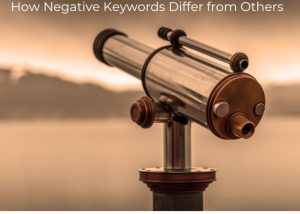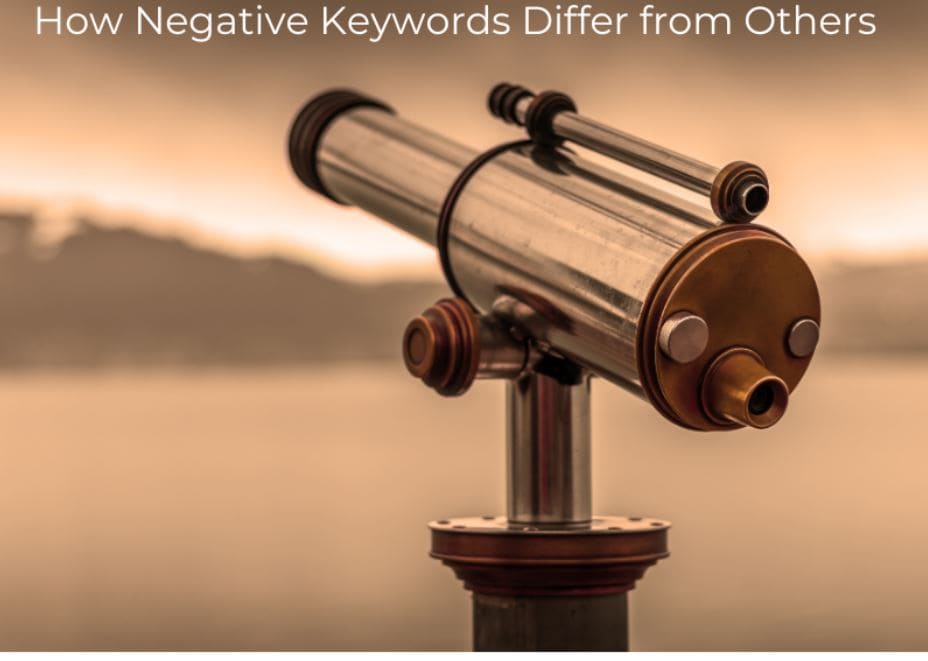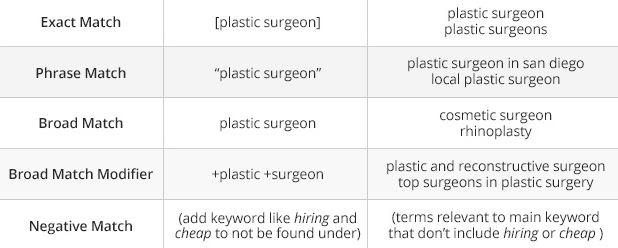
What Makes Negative Keywords Different from Others?
Of the 5 primary keyword match types relevant to pay-per-click (PPC), negative keywords give exclusionary control over what queries serve up your ads to searchers. More specifically, a negative keyword list has all the functionality of the other 4 targeted keyword types, but works in reverse. For example, a regular, targeted keyword list works as follows and in the outlined sequence until we get to the 5th row of the below table, entitled Negative Match.
Once at the Negative Match column, we can work backward from the Broad Match Modifier row to the Exact Match row, with the exclusion of specific keywords in mind, where broad match modifier negative keyword lists exclude the most potential queries used to serve up your ads to searchers, and exact match excludes the fewest and most specific instances of certain keywords.
There are 5 primary types of keywords that matter in Search Network advertising for Google and Bing: broad match, broad match modifier, phrase match, exact match, and negative match. In the middle column of the below image, you’ll see how the keyword should be typed into a keyword list to activate each specific keyword match type when setting up keywords for your advertisements.
Photo Credit: https://www.rosemontmedia.com/search-engine-marketing/5-types-of-keyword-matches-on-adwords/
Therefore, a negative keyword is a keyword that may fall under a phrase match or broad match modifier set of keywords you’ve added to your account that you want to remove without preventing your ad from popping up for other relevant, but unknown queries.
Why Do Negative Keywords Matter in PPC?
Negative keywords matter because not wasting your pay-per-click budget on paid search requires that you use them. Negative keywords are just as important to successful pay-per-click campaigns as targeted keywords. However, mastering them and ensuring the artificial intelligence embedded into paid digital advertising platforms like Google Ads or Bing Ads doesn’t rob you blind of your marketing budget requires an entirely understanding and approach. Keywords are the biggest part of any PPC campaign, account, or PPC strategy. We devote a massive amount of space to explaining negative keyword lists’ significance here not just because the WordWoven team loves words (and keywords), but because negative keywords are arguably the most important subset of information necessary to an effective PPC campaign’s anatomy.
Negative Keywords Drive Away Non-Customers, Which Is Just As Important as Attracting Them
The single most important thing in any marketing practice is to get customers (or at least initiate lead-generating steps in the customer pipeline). However, this objective should also be measured against ensuring that you exclude non-customers from your targeting efforts, and the rationale is simple: you’ll cut your costs on clicks by stating not just what services and products you offer, but also which ones you don’t offer.
Best Practices for Negative Keywords: 5 Tips
While there are an equal (and seemingly innumerable) number of tips for keyword development, research, and implementation and set up within PPC platforms, the list for negative keywords is far shorter. However, that doesn’t necessarily make following negative keyword best practices any easier.
1. Remember that Your Standard, Affirmative Keywords and Negative Keyword Lists Interoperate
If you’re targeting a keyword like hardware for computers, you wouldn’t add [hardware for computers], which is the ‘exact match’ match type given the brackets around the search term, to both your targeted and negative keyword lists, because doing so would cancel out any impact targeting the search term would have. However, it might make sense to target the same search term with a different keyword match type depending on your industry, budget, and objectives.
2. When Your Ads Get Clicks from Irrelevant Queries, Add them as Negative Keywords
The best practice is to remember that the wider the net you cast with the keyword match type, the more closely (and frequently) you should monitor the queries generating clicks for your ads. This is because broad match keywords serve up your ads for the widest range of potential search terms. When you add irrelevant terms to your negative keyword lists, you’ll ensure that you’re not wasting money on irrelevant clicks that won’t lead to new business for your company. However, the world’s top pay-per-click expert, Jason McDonald, recommends never bidding on broad match keywords, and we agree with this wholeheartedly. This is the case because these platforms are not built to save you money, which we’ll delve into in the following section.
3. Never Bid on Broad Match Keywords, Even with Negative Keyword Lists
Creating a negative keyword list full of broad match keywords may destroy your ability to uncover new, helpful keywords profitable to your PPC campaigns, because they’d be too exclusionary. Every organization will have a different number of keywords relevant to their target audience. However, regardless of how large that viable keyword list is, the broad match keyword type should never be used in any bidding process, because it’s a budget waster and hindrance to any skilled PPC practitioner looking to generate ROI, not just revenue. The broad match excludes nothing, and therefore includes everything, including junk keywords of which you may not have accounted for in opting in for them. Once you realize you’ve lost thousands of dollars to clicks and impressions for irrelevant queries, there’s no way to get the money back.
4. Know Which Keywords Detract from Your Core Objectives, and Which Ones Don’t
All keywords are either educational, transactional, or reputational. In addition to ensuring your ad groups reflect the keywords in them, make sure you bid appropriately for the most expensive transactional keywords and least expensive educational keywords. The opposite concept applies to creating negative keyword lists.
5. Remember Negative Keywords Are a Microcosm of this PPC Tidbit
And that tidbit is that PPC platforms’ AI (artificial intelligence) still can’t do all the heavy lifting for their practitioners. While pay-per-click marketing platforms like Google Ads have many embedded AI functions to guide PPC experts in the management of their interfaces, the AI-generated suggestions aren’t always designed with your best interest in mind; that’s where a skilled PPC practitioner comes into play.
It’d be great if we lived in a digital marketing world where paying employees and platforms for owned lead generation results was conflated into a single payment to the platform itself, but there are still too many competing interests between paid advertising platform engineers and search marketers for this to become reality.
You may think paying for a top-tier PPC service is a pain, but that pain pales in comparison to the pain of money wasted on unskilled and inexperienced PPCs, because much like the AI built into PPC platforms, inexperienced PPC managers and practitioners aren’t always there to help you.
Let neither the powerful features in each platform nor their organizations’ oversimplified marketing messages regarding the embedded AI power of their tools dupe you: managing PPC isn’t like riding a bike. Your assistant, intern, or standard marketing specialist can’t just pick up these practices and let the platforms manage themselves.
For example, Google Ads makes minimum bids for certain keywords look like objective answers to the question of how much you should bid on a particular keyword. However, selecting a manual CPC strategy and testing bid prices beneath that minimum bid threshold for various keywords has, in numerous verified instances, still placed keywords into the top Ad slot on Google’s first page.
What else can this mean other than Google artificially inflating the bid floor to take more of your money than necessary? And, since most PPC platforms on a variety of networks were engineered with Google as their model, it’s also likely that search engines like Bing and Yahoo rely on this decoy. This is just one of many instances in which marketers should use AI technologies cautiously and without wasting their advertising budgets.
Need help with implementing a negative keyword list, or setting up the right keywords for your PPC campaigns? Visit our pay per click and SEM services home page to learn more about our pricing and procedures for this portion of our keyword-driven founding mission: to restore the power of the written word via profitable, branded solutions.


